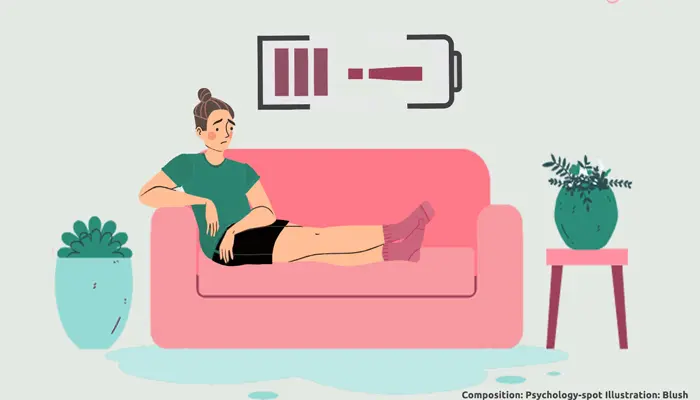
“Resignation is a daily suicide”, wrote Balzac. And he was not wrong. When life hits us and problems pile up, we can think that resignation is the only alternative. We believe that we have no choice but to grit our teeth and resign ourselves to our bad luck.
However, resignation often does not alleviate suffering, but rather perpetuates it by plunging us into a pessimistic view. In fact, a study conducted at the University of Manitoba found that people who respond to a cancer diagnosis with resignation have a higher risk of long-term mental disorders.
What is resignation? Its psychological meaning
Resignation is giving up on changing things, settling for what happens, even if it hurts us. It is a surrender to obstacles, not because they are insurmountable but because pessimism or mental fatigue overcomes us. Therefore, it implies a passive attitude towards the facts.
The concept of resignation does not imply an adaptive response to reality, but rather a submission to a reality that overwhelms us. By resigning we run the risk of assuming the role of perennial victims or beginning to feel sorry for ourselves, telling ourselves that we cannot do anything to change the situation we are in.
By thinking that “This is what I deserve and I can do nothing to change it”, we get trapped, we do not move in the direction we want in life, but we orbit around misfortune.
3 differences between resignation and acceptance that we should all know
1. Resignation generates helplessness, acceptance leads to serenity
The emotional states that generate resignation and acceptance are quite different. When we resign, we usually feel defeated. By giving up, we feel that we are unable to bring about the necessary change. This creates a feeling of sinking and helplessness that can even lead to depression.
Instead, when acceptance sets in, it usually leads to a state of calm and serenity. Acceptance helps us focus on the things that are in our control to change what we can, in a way that even gives us a sense of empowerment.
2. Resignation comes from fainting, acceptance from reflection
Resignation arises from giving up, from the feeling that we cannot do anything to change what happens to us because any effort will be useless. It is often the result of a pessimistic or defeatist attitude towards life, it is thinking that “This is what I deserve and I cannot do anything to change it.” In fact, resignation often stems from exhaustion.
Rather, acceptance is usually the result of a deeper analysis of the circumstances. It implies verifying that things are not going as we would like and accepting that reality, but with a resilient attitude. We accept what we do not like because we know that it is the first step to change our situation in some way.
3. Resignation condemns us to suffering, acceptance helps us heal wounds
Resignation is usually a coup de grace for our motivation, condemning us to immobility and passively suffer what happens. Coming from a feeling of helplessness, it does not usually involve a deep analysis of the causes, which prevents us from learning from our mistakes. In fact, resignation often keeps us mired in trouble, suffering without finding a way out, condemning us to a kind of continuous samsara.
Acceptance, on the contrary, allows us to assume a psychological distance to see things in perspective. It is a conscious process in which we immerse ourselves in the situation and understand it better. This allows us to understand our role, detect our mistakes and learn from them. Therefore, acceptance is essential to mend the broken pieces and recover.
The step from resignation to acceptance
Understanding the differences between resignation and acceptance will allow us to choose how to react to life’s problems. Acceptance involves seeing things as they are – and also how they are not. Resignation, on the other hand, implies deciding that things are as they are and cannot be changed.
We practice acceptance when we say: “Today it is raining, I will take an umbrella.” We resign ourselves when we say: “Today it is raining, my day will be a disaster.” While with acceptance we assume a pragmatic, neutral and judgment-free attitude, with resignation we assume a negative attitude that adds to our problems.
The problem is that we don’t even realize it, so we keep adding resignation after resignation to our problems, until they reaches the point where their weight prevents us from moving forward. The first step is to realize this and understand that we need more acceptance and less resignation.
A study carried out at the University of Milan found that when problems become chronic there is a turning point in which we choose to resign and suffer in silence or we embark on the path of acceptance and resilience.
When we bet on radical acceptance we see reality more objectively. We analyse the problems and decide how to act. We are aware of adversity and the damage it causes us, but instead of limiting ourselves to passively suffering, we ask ourselves how we can limit its influence.
When we resign we only see the negative side of the situation and we assume that what happens to us is something immutable, which condemns us to continue suffering. To get out of resignation, we need to stop judging the things that happen to us by labeling them in terms of “good” or “bad.” We also need to understand that everything is constantly changing and evolving, including the situation that harms us today. So the next time we reach that tipping point, we must remember that the alternative to resignation is acceptance.
Sources:
Riva, P. et. Al. (2016) Chronic social exclusion and evidence for the resignation stage: An empirical investigation. Journal of Social and Personal Relationships; 34(4): 541-564.
Hack, T. F. & Degner, L. F. (2004) Coping responses following breast cancer diagnosis predict psychological adjustment three years later. Psycho-Oncology; 13(4): 235-247.



